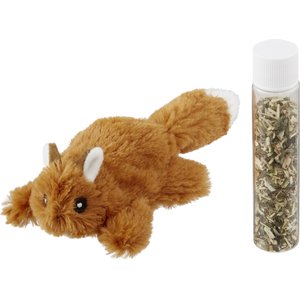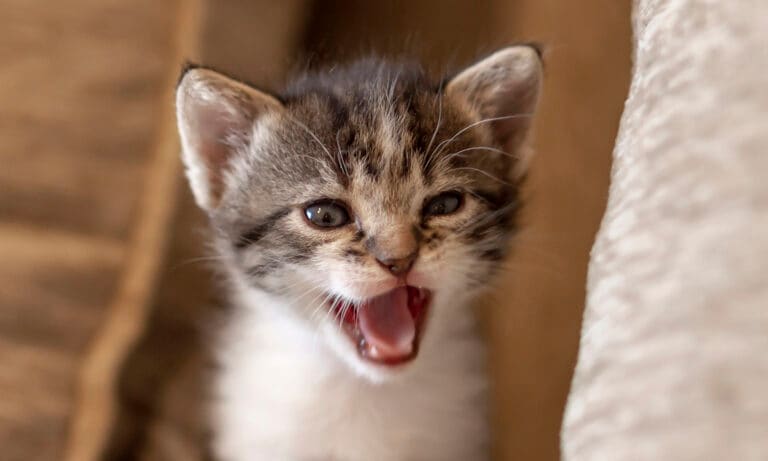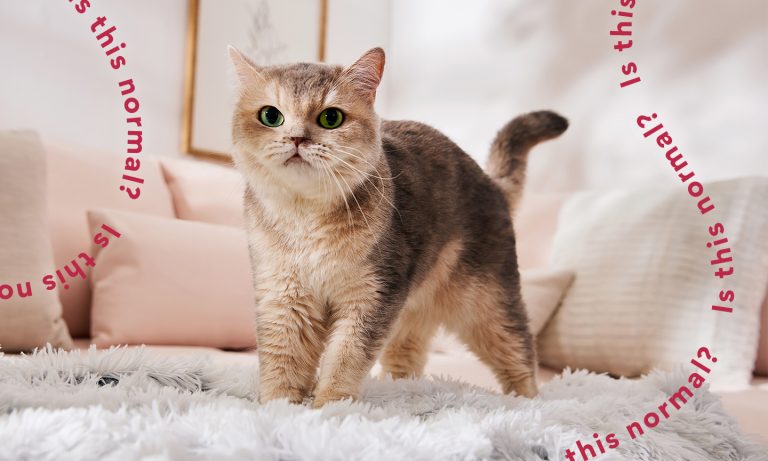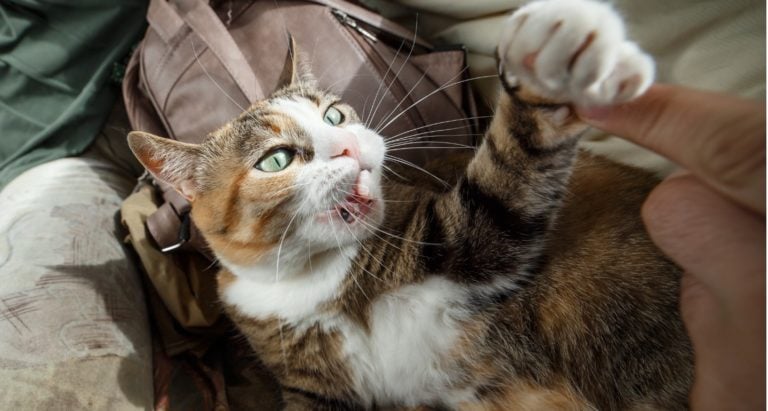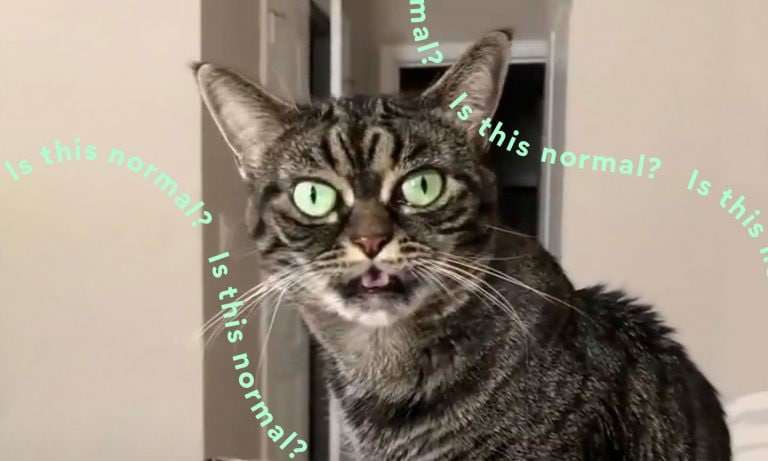Q:My cat loves to lick my face, hands, and even my hair! He seems to enjoy doing it and will randomly clean me throughout the day. But why does my cat groom me? Is this normal?
A: Yes, it’s totally normal for cats to groom their pet parents. This is one of the many signs that your cat has chosen you as their favorite person. Generally, grooming you means they love you and trust you.
If there’s anything cats take very seriously, it’s their personal hygiene. And sometimes yours too!
We talked with Bethany Hsia, DVM, co-founder of CodaPet in Clovis, California, and Stephen Quandt, CFTBS, founder of Stephen Quandt Feline Behavior Associates, LLC, in New York City to learn more about this cute and quirky behavior.
In This Guide:
Why Does My Cat Groom Me?
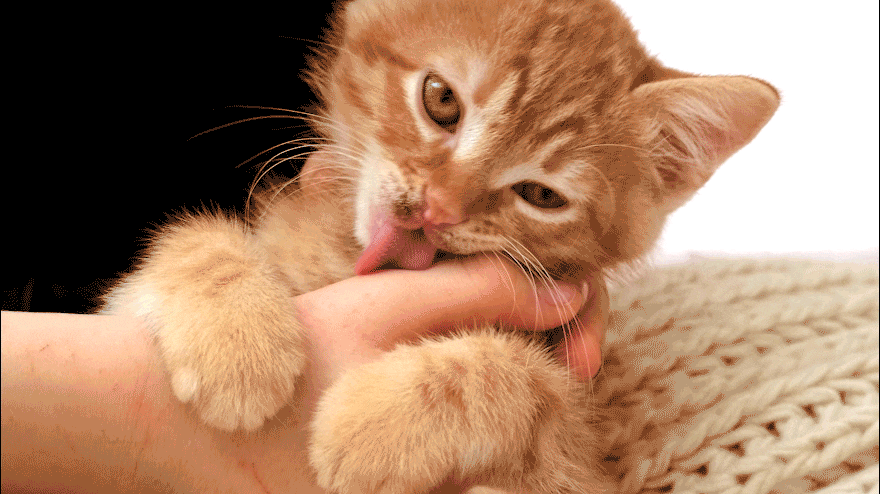
Chewy
Being able to understand our cat’s (sometimes strange) behaviors and body language helps us gain insight into their well-being. As a result, we can build a stronger bond by appropriately responding to their needs, whether with a simple pet or a trip to the vet.
Here are the most common reasons cats groom you, according to our experts.
They’re Cleaning You (Because They Love You)
Among the most common reasons your cat grooms you is that they want to literally clean you. Grooming is a natural cat behavior that serves to strengthen social bonds among members of their species, Dr. Hsia says. When your cat grooms you, they may be expressing affection and trust, similar to how they would groom other cats in their social group.
In other words, they’re communicating that they see you as family, Quandt says. Other ways cats show you they love you is with kneading, showing their belly, and head butting.
“For me speaking personally, I consider being groomed by my cats to be a badge of honor!” Quandt says. “What better feeling is there than having that prickly tongue tickling one’s skin while knowing you are the loving recipient of your cat’s attention?”
They’re Claiming You
In some instances, your cat may be grooming you as a way to claim you. (Lucky you!) This is similar to when they adorably rub up against you.
Cats do this to mark territory through the scent glands located in their saliva, reinforcing their bond with their human companions, Dr. Hsia explains.
They Want Attention
Between not acknowledging you when you excitedly call their name to brazenly showing their disapproval for your latest cat toy haul, there are moments when our kitty companions might seem aloof, to say the least.
But when they want attention, they’ll be sure to let you know. They might do things like meow loudly, knock over your favorite plant, or even put their butt in your face. You know, typical cat things.
When your cat grooms you, this could be their way of telling you that they want—or demand—your attention at that very moment. (But just the “right” amount, of course.)
They Like the Smell or Taste of Your Skin
Cats are naturally equipped with a powerful sense of smell and unwavering curiosity. Thus, they might investigate a scent by grooming you, and may enjoy the salty taste of your skin or the scent of soap, Quandt says.
Be careful if your cat attempts to groom you after you’ve applied products like sunscreen, insect repellent, or topical medications, as these can be harmful to cats if ingested. Offer them a lickable cat treat like Hartz Lickable Chicken Cat Treats if they’re keen on grooming you. Plus, you’ll also satisfy their cravings.
They’re Relieving Stress
Like sucking on blankets and kneading, grooming can also be a self-soothing mechanism for cats. If your kitty is feeling anxious or stressed, they might engage in this behavior with you to seek comfort and reassurance, Dr. Hsia says.
Make sure to offer extra cuddles and a calm, quiet space if you suspect they’re feeling stressed for any reason.
They May Have Health Issues
Grooming is typically considered a normal behavior. However, Quandt and Dr. Hsia note that there are certain instances when it could indicate underlying issues that warrant a vet visit, including:
- Excessive or compulsive grooming: If you notice skin irritation or hair loss on your cat—or even yourself!—this could be a sign of anxiety or other behavioral problems that need addressing, Quandt says. They may also be nauseous or have an underlying medical condition, Dr. Hsia adds.
- Distress during grooming sessions: Overgrooming can be linked to stress-related disorders in some cases. Other signs a cat may be stressed include hiding, increased vocalization, and appetite changes.
- Sudden increases or decreases in grooming habits: This can be an indicator of health issues, like allergies or skin conditions.
It’s always a good idea to consult a veterinarian or cat behavior specialist if you notice behavioral changes in your cat.
Should I Do Anything About This Behavior?
Does your feline friend groom you as if they’ve just been hired as your purr-sonal esthetician? While you technically don’t have to do anything about this behavior, it’s ultimately your choice whether you want to encourage or discourage your kitty from cleaning you.
If you’d prefer not to get cactus licks from your furry friend, here are few tips from our experts that can help:
- Gently redirect your cat’s attention. No grooming? No problem. Instead, you can keep them engaged with toys, like the Frisco squirrel plush toy with catnip or interactive play whenever they’re about to groom you.
- Step away from them briefly. When doing so, provide an alternative form of affection, such as petting your cat or brushing them. It’s a win-win for you and your feline companion!
- Change your soap, shampoo, or fragrance. Your cat might be especially drawn to how one of your products smells. Consider switching or a fragrance-free option that might not be as appealing to your kitty cat if they tend to groom you when you use it.
- Create a calm, stress-free environment. Some stressors may trigger anxiety-driven grooming behaviors. Setting up a safe space for your cat can provide them with the security and comfort they’re seeking during stressful moments. Depending on the stressor, natural sound machines, calming chews, and anxiety-reducing plush toys may help ease feelings of anxiety or fear.
FAQs About Cat Licking
Q:Why does my cat lick my hair?
A:Your cat might lick your hair because they want to show you affection or are looking for attention.
Q:Why does my cat grab my hand and groom me?
A:Your feline friend might grab your hand and groom you as a way to get your attention—so long as there is no nibbling or biting, Quandt says.
This content was medically reviewed by a veterinarian.
Share:


